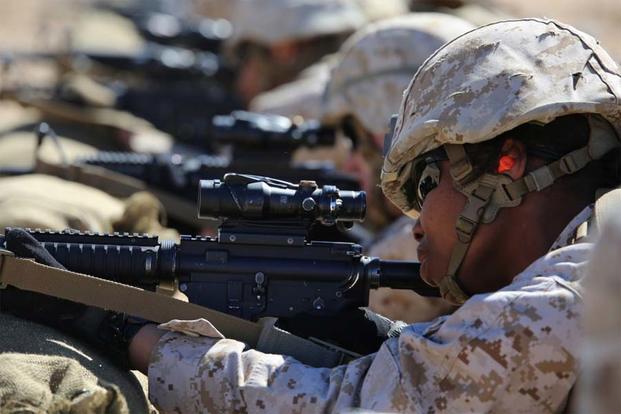Just over a year after Defense Secretary Ash Carter issued a mandate opening previously closed ground combat jobs to women, the Marine Corps expects to see its first female recruits with infantry contracts graduate boot camp, bringing them one step closer to billets in combat arms units.
To date, 31 female Marines have signed enlistment contracts for previously closed combat arms military occupational specialties, or jobs, Jim Edwards, a spokesman for Marine Corps Recruiting Command, told Military.com.
Of these recruits, 21 have active-duty contracts for "03XX" ground infantry jobs, a field that includes rifleman, mortarman and machine gunner, among other jobs, Edwards said. Nine more have committed to four different artillery, vehicle and air support jobs, including field artillery cannoneer, armor Marine, assault amphibious vehicle Marine, and low-altitude air defense gunner, he said. And one woman enlisted on a reserve contract as a light armored vehicle Marine.
The new enlistees quietly began shipping to boot camp this fall. Edwards said 16 shipped to recruit training Oct. 1, and 15 remain in the delayed entry program and are expected to ship to recruit training after the start of the new year.
While the Marine Corps has two boot camps, in Parris Island, South Carolina, and San Diego, California, all female recruits train in Parris Island, home of the service's only all-female recruit training battalion.
A spokesman for Parris Island, Capt. Gregory Carroll, told Military.com that nine women with infantry contracts are currently in boot camp training at the base.
"These are the first women to arrive to recruit training with infantry contracts, and they have all met the required gender-neutral standards," Carroll said. "This serves as a testimony to the
Marine Corps' goal of leveraging every opportunity to optimize individual performance, talent and skills to maximize our warfighting capabilities. All nine women remain in recruit training, and the first group is scheduled to graduate in January 2017."
While most of the women have not been identified, two were quoted in a Marine Corps news release earlier this month. Recruits Maria Daume, of Long Island, New York, and Katelen Van Aken, of Dover, New Hampshire, arrived at Parris Island on Oct. 17, according to the release.
In a statement, Van Aken said she long knew infantry was where she wanted to be.
"It's what I want to do, so that's the end of it, and everyone knew not to try to change my mind," she said. "When it became available, I jumped at it. It's what I've been working half a year for."
Daume, who was born in a Russian prison and adopted by an American family at the age of four, according to the release, credited her upbringing and early life for giving her the toughness needed to succeed in the infantry.
"I played a lot of sports in my life, like basketball, soccer, lacrosse and field hockey," she said. "I also did [mixed martial arts] and Jiu-Jitsu. With MMA, it is all about staying calm and not getting angry. If you get angry, you can make stupid mistakes. I know how to get hit and keep cool. With the team sports, you have to work together. When you're a team, you're a family."
Since Carter announced in early December 2015 that all services would have to open close combat arms and special operations jobs to women, the Marine Corps has implemented a series of stringent physical entry barriers for infantry and ground combat jobs, designed to ensure men and women who enlist for these jobs can succeed in the fleet.
Upon enlistment, poolees interested in infantry jobs must complete a gender-neutral initial strength test requiring them to complete a 1.5-mile run within 13 minutes, 30 seconds; three pull-ups; 45 lifts of a full ammo can within two minutes; and 44 crunches within two minutes.
Non-infantry enlistees also must complete an initial strength test, but it does not include an ammo can lift, and has gender-normed standards, with a relaxed run time for female Marines and the option of completing push-ups for both genders.
Once in boot camp, recruits planning to go infantry must pass another hurdle to stay on that career track. Eight weeks into training, those entering specific ground combat arms jobs are required to complete a "classification standard" which requires six pull-ups; 60 ammo can lifts within two minutes; timed movement-to-contact and maneuver-under-fire exercises; and a three-mile run in just under 25 minutes.
To date, the enlistment rate for female recruits seeking to go infantry is lower than Marine leaders anticipated. According to a strategy document published early this year, Marine planners expect about 200 female Marines to enter ground combat jobs per year, less than two percent of all Marine personnel in these jobs. Officials also noted, however, that it may take time for the pace of female Marines entering combat arms to pick up amid the newness of the changes.
Leaders of the Marine Corps Force Innovation Office told Military.com in March that they were beginning the process of moving female staff noncommissioned officers in support roles ranging from administration to supply into the infantry units that will be receiving the first female grunts, to set the best conditions for these new female infantrymen to succeed.
-- Hope Hodge Seck can be reached at hope.seck@military.com. Follow her on Twitter at@HopeSeck.
Related Video:
Two Minute Brief: Women in the U.S. Military




























